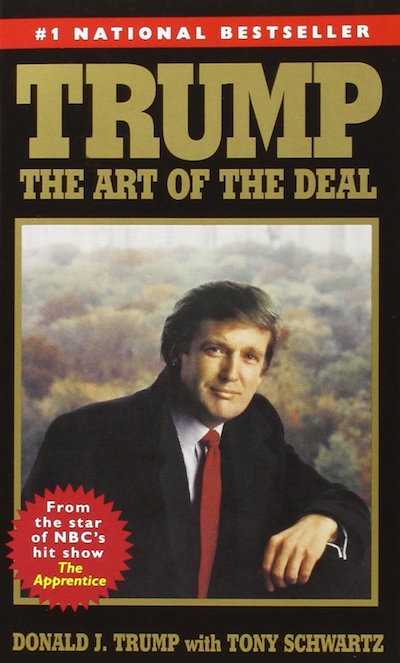Donald Trump, “The Art of the Deal,” and the ethics of ghostwriting
 The New Yorker just published a fascinating article, “Donald Trump’s Ghostwriter Tells All,” revealing what really happened when Tony Schwartz ghostwrote The Art of the Deal for Donald Trump. Schwartz says, “I feel a deep sense of remorse that I contributed to presenting Trump in a way that brought him wider attention and made him more appealing than he is.” We learn, not just about the synthesis and elevation of Donald Trump’s persona, but how ghostwriters must sometimes make the painful choice between the truth and the client.
The New Yorker just published a fascinating article, “Donald Trump’s Ghostwriter Tells All,” revealing what really happened when Tony Schwartz ghostwrote The Art of the Deal for Donald Trump. Schwartz says, “I feel a deep sense of remorse that I contributed to presenting Trump in a way that brought him wider attention and made him more appealing than he is.” We learn, not just about the synthesis and elevation of Donald Trump’s persona, but how ghostwriters must sometimes make the painful choice between the truth and the client.
What Tony Schwartz reveals about Donald Trump

Schwartz agreed to ghostwrite the book for half of the proceeds, including splitting a $500,000 advance. Because Trump couldn’t sit still long enough in interviews to string together the ideas a ghostwriter needs, Schwartz ended up shadowing him for over an 18-month period in 1985 and 1986, including listening in on his calls as he made deals. He then synthesized an appealing, edited version of Trump and has felt guilty about that ever since. So he unburdens himself now by revealing the fuller truth — the parts of Trump’s personality you won’t read in his books.
“I created a character far more winning than Trump actually is.”
“Lying is second nature to him. . . . More than anyone else I have ever met, Trump has the ability to convince himself that whatever he is saying at any given moment is true, or sort of true, or at least ought to be true.”
“He lied strategically. He had a complete lack of conscience about it. . . . [It] gave him a strange advantage.”
[In the book, Schwartz’s wrote this in Trump’s voice:] “I play to people’s fantasies. . . . People want to believe that something is the biggest and the greatest and the most spectacular. I call it truthful hyperbole. It’s an innocent form of exaggeration—and it’s a very effective form of promotion.” [Here’s what Schwartz believes now:] “Deceit [is never] innocent. . . . ‘Truthful hyperbole’ is a contradiction in terms. It’s a way of saying, ‘It’s a lie, but who cares?’ ”
“[A] stunning level of superficial knowledge and plain ignorance. . . . I seriously doubt that Trump has ever read a book straight through in his adult life.”
“[I]t’s impossible to keep him focussed on any topic, other than his own self-aggrandizement, for more than a few minutes, and even then . . . If he had to be briefed on a crisis in the Situation Room, it’s impossible to imagine him paying attention over a long period of time.”
“I genuinely believe that if Trump wins and gets the nuclear codes there is an excellent possibility it will lead to the end of civilization.”
The ethics of ghostwriting
I feel for Tony Schwartz. Here’s what he said about the process he went through:
“It was one of a number of times in my life when I was divided between the Devil and the higher side.”
“I knew I was selling out. Literally, the term was invented to describe what I did.”
“[I was] trying hard to find my way around [behavior that I considered] if not reprehensible, at least morally questionable.”
I haven’t ghostwritten a book. But I have ghostwritten articles for authors of books that I edited, written chapters in my coauthored books based on the ideas of others, and written or rewritten big chunks of book proposals for other people. It’s a challenge because you need to reconcile three things:
- The whole, balanced truth.
- The portion of the truth that support the points the author is making.
- The author’s ideas, some of which you may not agree with.
In writing, there is no such thing as the whole truth. You always leave things out to tell a story. All writers select elements of the truth that tell the story they want to tell. But that balance is harder to achieve when you are ghostwriting, because you have two masters — the true story and the story the author wants to tell.
There’s a contingent out there that believes ghostwriting is always unethical. That’s not my experience. If you as a writer are better able to tell someone’s story than they could themselves, there’s nothing wrong with that.
The problems occur when you don’t believe the writer’s story. If you must choose between what you see as the truth and the author’s “truth,” you’ll end up like Tony Schwartz — conflicted and guilty. A ghostwriter with a conscience will have problems here, because you’ll either need to lie and distort, or fail to live up to the client’s needs — a lose-lose situation.
If you take a writing job and you have a conscience, you must diligently verify that you and the author are morally compatible and have a similar idea of the truth. This is a lot of work to do ahead of time. But if you fail to do it, you could end up like Tony Schwartz, a man who realizes that he helped create a persona by distorting the truth — a persona that now has a good chance of winning the race for the presidency.
Interesting article – and beautifully written too.
One interesting observation is that Trump is ADHD. First I had heard this point made, and it makes complete sense to me.
I doubt this guy will ever be trusted by anyone again. His shameful political need to see his 15 minutes of fame has clouded his judgement and integrity as a writer.
He didn’t do the ghostwriting for fame he did it to feed his new family. His wife was pregnant and they were already struggling to pay the mortgage/rent where they were living. Read his full article before you judge. I don’t agree with what he did, but I understand why.
Clearly Trump failed to articulate the difference between ghostwriting and plagiarism to his wife.
While the ethics of ghostwriting may be in a debatable grey area, plagiarism certainly is not.
I never read the book but I confirmed every one of his admissions just from observing Trump for the last 12 months: ignorant, never finished a book in his adult life, lies continuously, exaggerates everything, loser. What a tragedy. A disaster for our country.